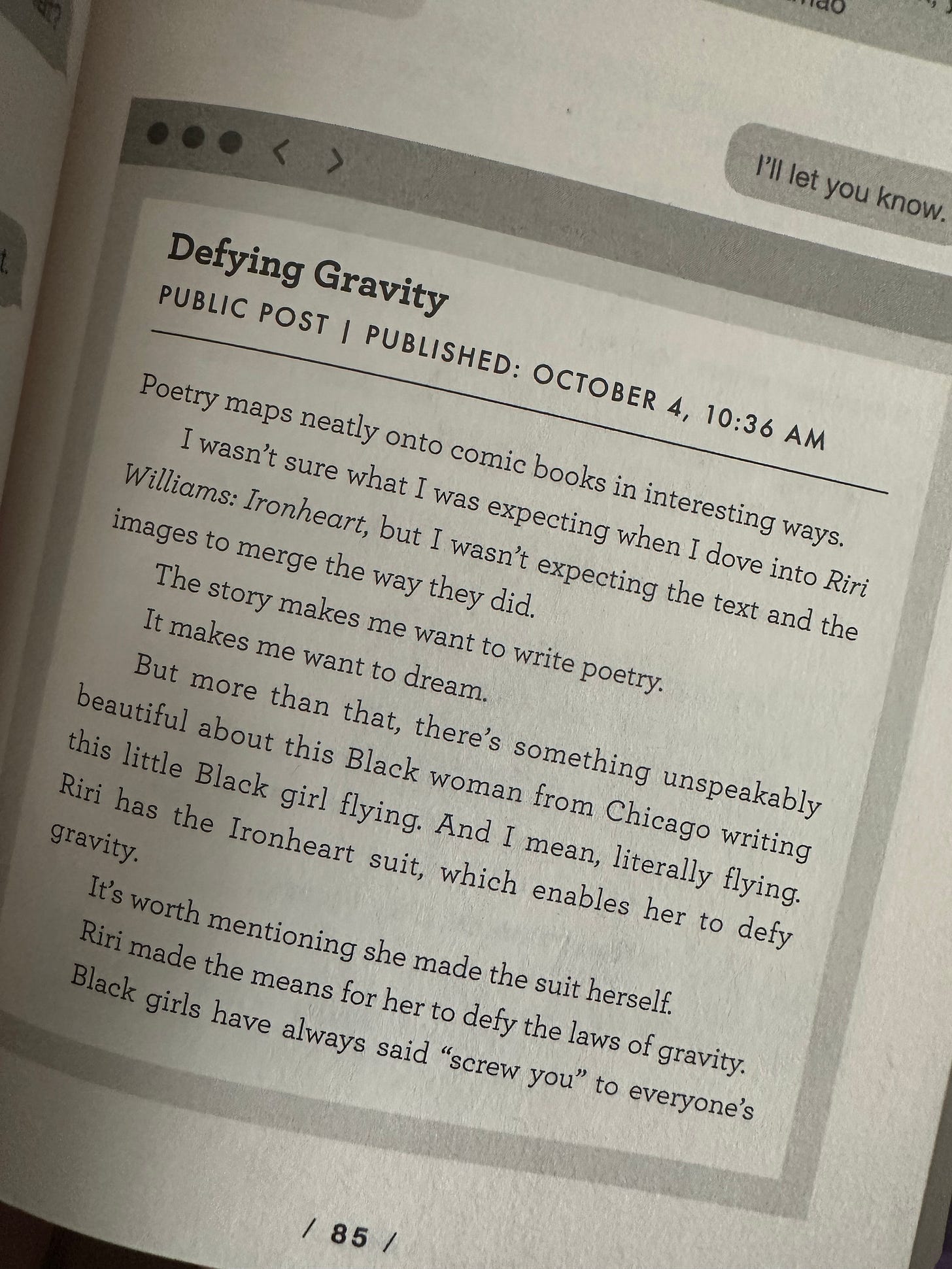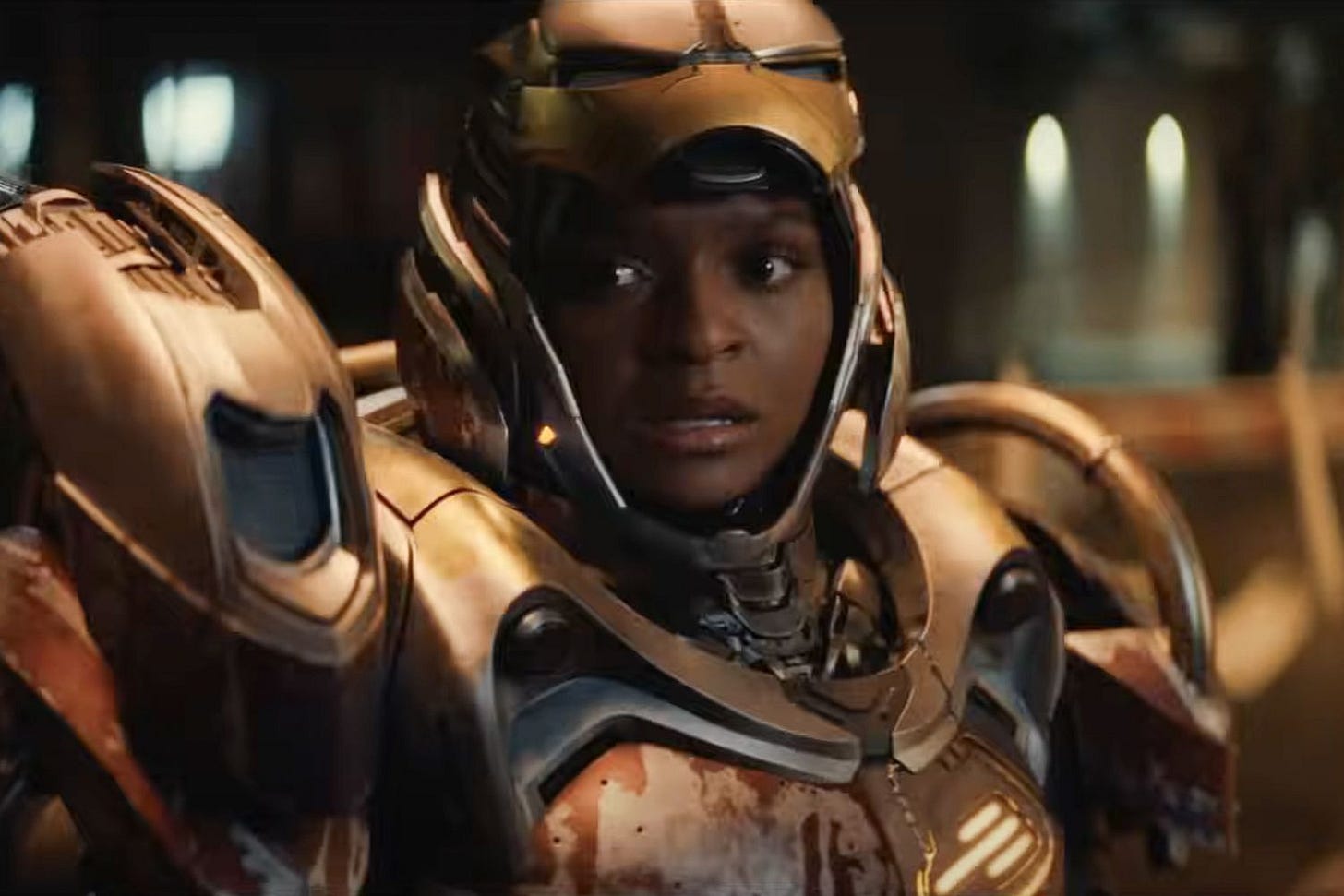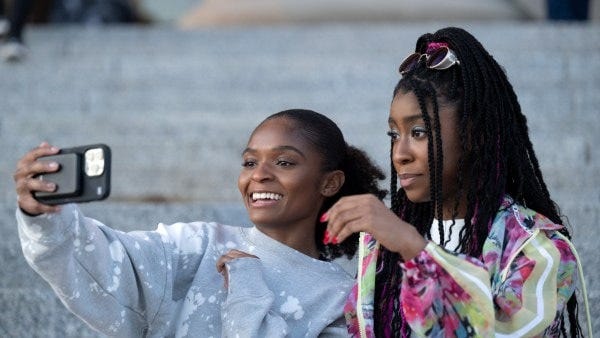Riri Williams, Bad Girl Genius
Yes, I have already watched all three episodes twice. This is likely part 1 of ?
“Eager” doesn’t quite do justice to the fervor with which I awaited the Disney+ Ironheart show, which just premiered with the first three episodes in its season last night. I’m a big Riri apologist—the kind of person who writes the second chapter of her doctoral dissertation about her, wins an honorable mention for an essay about her and finds a way to sneak a Riri cameo into her second published young adult novel.
Why? I don’t share a lot of Riri’s particular story. She’s a teen genius from Chicago with an uncanny ability to engineer the impossible. She’s lost people—namely her stepdad and best friend, Natalie—to gun violence.
But, like Riri, I was—and in a lot of ways, still am—a hungry Black girl.
Hungry as in: an insatiable desire to know and create.
Hungry as in: ambitious to the point of believing you could pluck the stars from the sky your own self.
Hungry as in: can’t stop, won’t stop.
That’s the Riri (played by Dominique Thorne) we get in this adaptation of Ironheart, created by Chinaka Hodge. Much of the backstory is familiar for comics purists, with a few creative liberties for what I suspect will make for tighter storytelling and greater tension on screen in the back half of the season. Here, the narrative starts with Riri’s expulsion from MIT after a mishap in the lab, and thus beginning a search to figure out how to fund her (extraordinarily expensive) tech work without the backing of an institution with an endowment in the billions.
Insatiable, Riri quickly allows herself to be swept in illegal activity orchestrated by The Hood (played by Anthony Ramos), if it means she can ultimately do her work.
But…why?
It’s a refrain the reverberates throughout the first three episodes. Various folks ask Riri why she feels the call to the suit, why it is the kind of work she would even sell her beloved stepfather’s car to fund. And her answers are…disappointing. At first, at MIT, her answers go well past altruistic, not even sounding believable to her dean. Then, they are dismissive: “Because I could.” Then…no response at all.
This is the heart (forgive the pun) of the show that proclaims to be an action packed adventure, but provides viewers with plenty of food for thought on ethics—largely ethics as it relates to technology, but there’s also a great deal to mull over when it comes to criminality as well. At the end of the first episode, Riri manages to create her own artificial intelligence for her suit after losing access to the AI from MIT, but Riri’s AI “somehow” takes the form of her deceased best friend, Natalie. Though Riri considers the program a “glitch,” when her mother, Ronnie, encounters N.A.T.A.L.I.E., she is moved by how closely it resembles the real flesh and blood girl, and asks if Riri could create one of her stepfather.
The ask is an emotional gut punch that I feel we move past far too soon. The show leads the viewers to understand that Riri’s inability to create a program of her stepfather is more about the process being unclear and therefore irreplicable than it is about whether it is a humane thing to digitally animate someone deceased. We haven’t yet seen the limitation of this technology, but with the presence a character whose entire profession is tech ethicist, I suspect questions around N.A.T.A.L.I.E.’s being are bound to animate the second half of the season. In interviews, Ryan Coogler, executive producer on the show, even says that delays on the show’s production make the conversations it raises around technology and ethics more relevant: “If it had come out when Wakanda Forever had come out, I don’t think it would’ve been the right timing for conversations around responsible, ethical behavior around technology.” (Coogler, Inverse)
As a former digital humanist, I suspect that these questions will be of interest to scholars who work at the intersections of tech, media and race. (I am doing my best to wait patiently for my friend Dr. Kristen Reynolds to watch so we can discuss this at length!)1 There was a really strong contingent of (Black) digital humanists who aimed to be self-reflexive about technology, how we make it and how we use it. This is partly what “Joe” tells Riri: a technology is only as ethical as creator is when they make it.
And arguably, as ethical as whoever comes to use the tool is.
In all honesty, Riri’s relationship to the stickiness of technological advancement, especially as a Black woman, reminds me of W.E.B. Du Bois’ proclamation that “All art is propaganda and must ever be.”2 If all art has a message it is trying to convince us of, then all technology must also be propaganda, too. The very idea that technology can be objective or without bias is one that scholars who take up humanistic critiques of technology combat daily.
For me, it’s just a matter of deciding what propaganda Riri’s story will tell us about technology by the end.
I think it’s interesting that Riri, a young Black woman from Chicago, is tasked with this large scale ethical question about her technology. A white male genius typically isn’t asked to justify his innovation. And so when Riri says “because I could” as a response for why she wanted to create the suit, it’s both a stereotypical line and one that is insufficient for her. Cultural specificity here means that Riri doesn’t actually get the benefit of the doubt, creation for the sake of creation. She must justify anything she makes and bear the brunt of this responsibility, whatever answer she comes to.
The creation of N.A.T.A.L.I.E. eases some of what this reality means for me. This is in some ways, the definition, of what I refer to as technomagic. Engineering the impossible, bordering on magic. Because Riri can’t replicate N.A.T.A.L.I.E., even if she wanted to, means she’s created this thing just for herself. Just because her heart needed it, when her mind wouldn’t allow her to dream it.
N.A.T.A.L.I.E.’s being raises a whole host of ethical questions, for sure, and she also represents something vulnerable Riri has made manifest, and thus I feel it’s worth protecting.
Of all the things I appreciate about Ironheart is its willingness to let Riri be in relationship with others. For much of her appearances in early comics, Riri is a lone wolf super genius. Any time we get to see Riri’s girlhood, especially one that she shares with friends, is one I will love. Dominique Thorne and Lyric Ross are dynamic on screen together. Lyric Ross, in particular, is absolutely stunning as Natalie/N.A.T.A.L.I.E., with her raw energy. As much as I have written about Riri as the epitome of technomagic girlhood, I think the time will soon come for me to write only about N.A.T.A.L.I.E., a sentient digital time capsule of a girlhood both cut short and infinite.
I never professed to write a review, because…well, that’s not my jam. I also did not intend to wax poetic about Black girl digital things, but I did because that is my jam.
And almost 1,500 words later, I don’t think I’m done with the ideas I began here, so likely I’ll be back soon with more. But I wanted to at least get something down while the show was fresh in my mind.
So, should you watch? Of course! We support Black girl media in this house.
But what you make of it is entirely up to you.
If this is interesting to you and you might want to explore some academic takes on AI and race, I was following the work of Dr. Tiera Tanksley and Dr. Joy Buolamwimi before I left academia. It’s never a bad idea to read Dr. Safiya Noble’s Algorithms of Oppression. I often assigned this Rolling Stone article by Lorena O’Neil about the women of color who sounded the alarm on AI well before it became a conversation in popular zeitgeist. Finally, because I mentioned Riri calls N.A.T.A.L.I.E. a “glitch,” Legacy Russell’s Glitch Feminism could also be a cool read!
From “Criteria of Negro Art” (1926): https://www.kennedy-center.org/education/resources-for-educators/classroom-resources/media-and-interactives/artists/du-bois-web/







